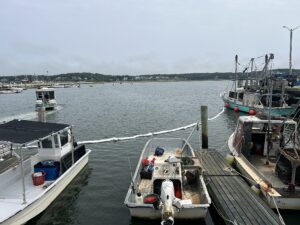WELLFLEET — Local and state agencies sprang into action when a sheen — later identified as spilled hydraulic fluid — was seen coating the surface of Wellfleet Harbor on the morning of Aug. 18. The spill expanded to cover approximately two acres from the L-pier, past the jetty, and out into the bay.

A swimmer who had encountered the slick in the water went to the harbormaster’s office around 8 a.m. to report it. “We jumped in a launch to confirm it,” said Jeff Kemprecos, the town’s assistant harbormaster. The harbormaster’s office notified the town’s fire dept., and from there word went out to the shellfishing and health depts.
Health Agent Heith Martinez said that the fire dept. was responsible for informing local, state, and federal agencies, which extended beyond Wellfleet to include the Mass. Dept. of Environmental Protection, the state Div. of Marine Fisheries, and the U.S. Coast Guard.
By 3 p.m., according to an Aug. 19 statement from Wellfleet Shellfish Constable Nancy Civetta, she and MassDEP inspector Jaime Goncalves had conducted a shoreline survey in the harbormaster’s boat and, in consultation with the DMF, had determined that Wellfleet’s commercial shellfishing beds were not at risk of contamination.
No remnants of hydraulic fluid were found during that survey. “It was agreed that there were no risks to public health and no further impacts to recreational use of the harbor,” Civetta wrote.
Local authorities had done what they could, but wind, the tide, and the movement of boats helped to disperse the material and push it toward shore as staff from the harbormaster’s office and fire dept. worked to contain the spill before staff from the MassDEP and Coast Guard arrived on the scene.
By the time they came, town staff had deployed booms around the L-pier, sectioning off the docked commercial fishing boats, and applied oil pads — large rectangular sheets engineered to absorb the oil but not water.
Interim Harbormaster Stuart Smith told the Independent that these tools work best when the spill is confined. He characterized this spill as so large and dispersed that neither booms nor pads could fully contain it.
“This fuel spill was massive, so we could only contain certain small areas with the number of booms that we have,” said Deputy Fire Chief Joseph Cappello at the harbor on Sunday.
MassDEP maintains an online database of chemical-specific reportable quantities and concentrations that instigate an assessment and clean-up process.
For diesel fuel, which Smith said he first suspected as the spilled material, the reportable quantity is 10 gallons. For petroleum-based hydraulic oil, the reportable quantity is 10 gallons, and for vegetable-based hydraulic oil, it is 55 gallons.
Spills believed to be in excess of these amounts must be reported to MassDEP within two hours of their discovery, and Wellfleet met that requirement. MassDEP Public Affairs Director Edmund Coletta told the Independent that MassDEP was notified of the spill in Wellfleet Harbor at 9:35 a.m. on Aug. 18.
Both Smith and Cappello told the Independent on Aug. 18 that they thought the spill was caused by a vessel that had departed the harbor around 7 a.m. and was fishing in the bay during the clean-up efforts.
Neither would name the vessel’s owner, and Cappello said it was possible that the boat’s captain was unaware of the leak. “Sometimes, the vessels don’t realize it is happening,” Cappello said.
The Coast Guard is leading an investigation into the source of the spill but as of this week’s deadline had issued no news, and a public affairs officer had not responded to the Independent’s requests for information.
According to Civetta’s statement, water and bilge samples were collected from the harbor as well as from several commercial fishing vessels to see if the source could be identified.
Coletta of MassDEP said that three vessels had been boarded and inspected by Goncalves and local officials. At that time, “It was determined that there was nothing that could identify the boats as the source of the spill,” Coletta said.
In the coming days, as the Coast Guard’s investigation continues, the responsibility of both the harbormaster’s office and fire dept. is to monitor the situation. “If we see any further oil sheens, and if it’s something we can confine and clean up, we will,” said Smith.
Anyone witnessing a spill, Cappello said, should make a video record of what they see so the source can be more quickly identified and the problem addressed.



